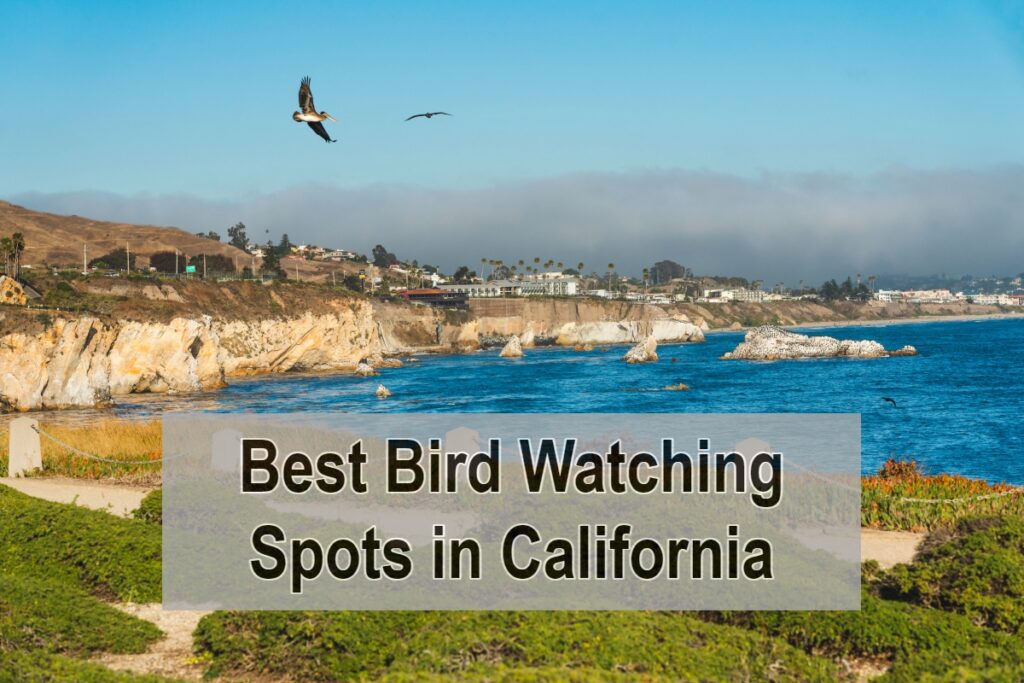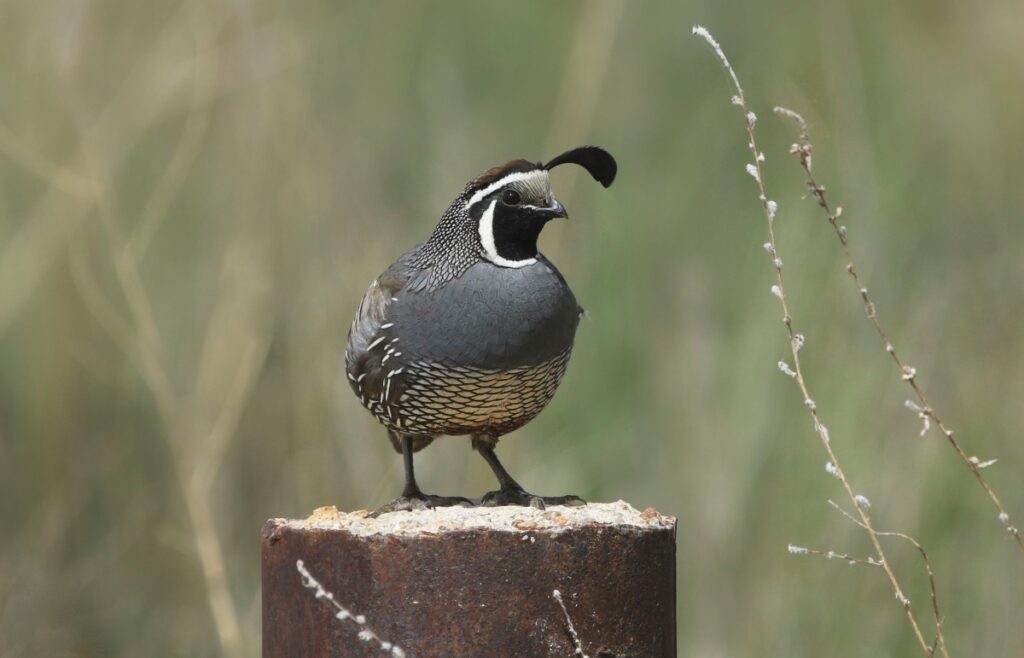As an Amazon Associate, we earn from qualifying purchases with no additional costs for you.
California is a large state, covering 163,695 square miles. It is not surprising that the bird species richness is very high, with 450 species being seen in the state.
The best bird watching spots in California are those that include many habitats, such as Klamath National Wildlife Refuge and Yosemite National Park. You can also see a lot of birds on the seashore and in estuaries at spots like Point Reyes National Seashore at Bolinas Lagoon.
A table giving the most exciting birds you can see at each of my top 16 birding spots in California.
| PARK | INTERESTING BIRDS YOU CAN SEE |
|---|---|
| Big Morongo Canyon Preserve | Lawrence’s Goldfinch and California Thrasher |
| Lower Klamath National Wildlife Refuge | Bald Eagle and Tundra Swan |
| Arcata Marsh and Wildlife Sanctuary | Sharp-tailed Sandpiper and Bar-tailed Godwit. |
| Elkhorn Slough National Estuarine Research Reserve | Bonaparte’s Gull and Marbled Godwit |
| Yosemite National Park | American Dipper and Pacific-slope Flycatcher |
| Point Reyes National Seashore | Nuttall’s Woodpecker and Chestnut-backed Chickadee |
| Bolinas Lagoon | Whimbrel and Greater Yellowlegs |
| Golden Gate National Recreation Area | Willow Flycatcher and Bank Swallow |
| The Presidio | Mew Gull and Allen’s Hummingbird |
| Tijuana River National Estuarine Research Reserve | Light-footed Clapper Rail and California Least Tern |
| Point St. George Reef Offshore State Marine Conservation Area | Common Murre and Brown Pelican |
| Anacapa Island State Marine Reserve | Pigeon Guillemot and Sooty Shearwater |
| Point Lobos State Natural Reserve | Western Gull and Black Oystercatcher |
| Anza-Borrego Desert State Park | Le Conte’s Thrasher and Gambel’s Quail |
| Salton Sea | American White Pelican and Eared Grebe |
| San Joaquin Wildlife Sanctuary | Cinnamon Teal and Snow Goose |
Read further to find out what the best bird watching places are in California.
TIP: If you want to check out the best pair of binoculars for bird watching, we recommend a pair of waterproof and fog-proof 8 x 42 binoculars like the Celestron – Outland X 8×42 Binoculars (Amazon link).
Best Places to Bird Watch in California
California is the third largest state in the U.S. The shoreline is 900 miles and extends from the drier regions bordering Mexico in the south to the wetter areas of Oregon in the North. The extensive range of habitats and microclimatic conditions provide many good places to find birds.
TIP: Knowing how to spot the birds in your yard is key to enjoying visits from your winged friends as much as possible! The best sources are trusted books, I recommend using the following (Amazon links):
– National Geographic Field Guide to the Birds of North America
– National Audubon Society Birds of North America
1. Big Morongo Canyon Preserve
This preserve is located at the bottom of the Little San Bernadino Mountains and is a 31,000-acre area. Cottonwoods and willows surround a riparian area. There are boardwalks and trails for people to walk on, making access easy for bird watchers.
At least 220 bird species have been recorded in the preserve. It would be best to look for birds like the California Thrasher, Red-shouldered Hawk, Phainopepla, Lawrence’s, and Lesser Goldfinch.
2. Lower Klamath National Wildlife Refuge
This is part of a set of refuges in northern California and extending into Oregon. The Lower Klamath National Wildlife Refuge has a visitor center in Tulelake, California. The refuge has such habitats as grasslands, croplands, and lakes.
You can see several birds here, and it is excellent in winter for seeing hundreds of Bald Eagles and thousands of Tundra Swans. Other water birds include Buffleheads and American Wigeon. In summer, look for nesting birds like White-faced Ibis, Great-Blue Herons, and Northern Flickers.
3. Arcata Marsh and Wildlife Sanctuary
This sanctuary is along the northern coast of the state. At least 300 bird species have been noted here in the sanctuary.
The sanctuary is so good because it is on the Pacific flyway of bird migration. The sanctuary is part of the wastewater treatment facilities for the city of Arcata. Many ponds with marginal vegetation and mud flats attract large numbers of waterfowl, marsh-loving birds, and shorebirds.
Species include Cackling Goose, Brant, and rare species like Sharp-tailed Sandpiper and Bar-tailed Godwit. At least 40 species of shorebirds have been recorded here.
4. Elkhorn Slough National Estuarine Research Reserve
This reserve is on the California coastline about 100 miles south of San Francisco. The reserve is rich in birdlife, with several waterfowl and waders present.
At least 251 species of birds have been recorded in this birding hotspot. You can also find Great-horned Owls nesting in the reserve.
Bonaparte’s Gull, Western Sandpiper, Forster’s Tern, Marbled Godwit, Long-billed Curlew, and Bufflehead are some birds you can see here. In vegetation, you can find Bewick’s Wren, Hutton’s Vireo, and Anna’s Hummingbird.
5. Yosemite National Park
Yosemite is a great place to see birds of higher elevation coniferous forests. The park has a range of different types of trees, including ponderosa pine, junipers, giant sequoia, and lodgepole pines.
The birds to watch include the White-throated Swift, Pacific-slope Flycatcher, Steller’s Jay, Cassin’s Vireo, and the unusual American Dipper.
The best time to visit Yosemite is in late spring and summer because some roads are closed during winter, and you won’t have as much access. You can visit the Yosemite Park website for more information on road closures.
6. Point Reyes National Seashore
This protected area is 71,028 acres and is located on the Point Reyes Peninsula. The bird species list for the area is more than 400, making this a must-visit spot for bird watchers.
Some of the birds found in the area include Nuttall’s Woodpecker, Wrentit, California Towhee, and Chestnut-backed Chickadee,
In winter, you can see birds like Varied Thrushes and Golden-crowned Sparrows. You can take many trails and roads in the area to look for birds.
7. Bolinas Lagoon
Over 300 species of birds are found here. It’s wise also to visit this area while visiting Point Reyes, as it is only a couple of miles south.
Bolinas Lagoon is a tidal estuary and an excellent spot to see shorebirds like Willet, Marbled Godwit, Whimbrel, Greater Yellowlegs, and American Avocet.
Look out for Ring-billed Gulls, Brown Pelicans, Great Egrets, and Belted Kingfishers. You can also find birds like Anna’s Hummingbird and California Scrub-Jay. You can use the checklist of birds for the area to see which species have been recorded here previously.
8. Golden Gate National Recreation Area
The Golden Gate National Recreation Area has a diversity of habitats, including sandy and rocky shores, scrub, grasslands, forests, and tidal marshes. The Willow Flycatcher and Bank Swallow are two threatened species in this area.
The cliffs in the area provide nesting sites for Brandt’s Cormorants and Brown Pelicans. Peregrine Falcons are also seen hunting around the cliffs. Mudflats provide ample foraging opportunities for shorebirds like Sanderlings and Western Snowy Plovers.
TOP TIP: If you think bird watchers are weird, read this article to discover the health benefits of bird watching. Are you a Bird watcher or a Twitcher? Find out here!
9. The Presidio
This urban park is located just before the Golden Gate Bridge. Even though it is in an urban area, over 200 bird species have been noted. The Presidio has open water, rocky and sandy beach areas, mixed woods, grassland, and marshy areas.
Birds in the water and muddy shores that you can look for here include Red-throated Loon, Western Grebe, Surf Scoter, Willet, Mew Gull, and Heerman’s Gull. Land birds like Brewer’s Blackbird, Allen’s Hummingbird, and American Goldfinch are also present.
10. Tijuana River National Estuarine Research Reserve
The reserve includes Imperial Beach on the California and Mexican border. It covers 2,500 acres and includes habitats such as a tidal salt marsh at the Tijuana river mouth, sand dunes, coastal sage scrub, and riparian thickets.
Bird species that you can find here include Light-footed Clapper Rail, California Least Tern, Northern Harrier, California Gnatcatchers, and Bell’s Vireo.
11. Point St. George Reef Offshore State Marine Conservation Area
This is an island that you can only access by boat. It is located in northern California and provides excellent views of seabirds.
Unique birds include the Common Murre, which breeds on the island. Brown Pelican and many other birds, including an assortment of gulls and terns, can also be seen in the area.
12. Anacapa Island State Marine Reserve
This island is part of the Channel Islands found off the coast of Santa Barbara. There are boat trips to the island a few times a day. You can learn more about trips to the island, the costs involved, and the available facilities.
It is worth a trip to see the thousands of seabirds here. Some of these birds are actual ocean birds that you won’t easily see elsewhere.
Pigeon Guillemot, Common Murre, Red-necked Phalarope, Northern Fulmar, and Sooty Shearwater can be seen. Guillemots, fulmars, murre, and shearwaters are oceanic birds worth seeing.
TIP: Check out my recommended products if you are looking for the best and trusted equipment for birdwatching in the wild or on your backyard (Amazon link):
- Celestron Outland X 8×42 Binoculars
- Celestron Ultima 80 Angled Spotting Scope
- National Audubon Society Birds of North America Book
- Design Free-standing Bird Bath
- Smart Bird Feeder with Camera
- Cedar Bird House for Outside
13. Point Lobos State Natural Reserve
This is an excellent reserve to visit close to the town of Carmel-by-the-Sea. The most popular trail for bird watchers is the Bird Island Trail.
At the end of this trail, you can see Bird Island, which has many birds, especially in spring and summer. Look for Western Gulls, Black Oystercatchers, Black-crowned Night-Herons and Brown Pelicans.
Point Lobos is for day use only. so you cannot camp in reserve. However, it is well worth a visit. There are many trails beside the Bird Island Trail that you can also walk on. It is also partly a marine reserve; if you are interested in sea life and birds, this is also a benefit.
14. Anza-Borrego Desert State Park
This is a large state park at 600,000 acres. More than 300 bird species have been recorded at Anza-Borrego Park, making it an excellent spot for bird watching.
You can see Verdins, Cactus Wrens, Western Bluebirds, California Quails, Le Conte’s Thrashers, White-winged Doves, Gambel’s Quails, and Crissal Thrashers.
15. Salton Sea
The Salton Sea is classified as a globally significant area for birds. It consists of an area of water and mudflats. The habitat is constantly changing, though, regarding how much water is present, and, therefore, which species are most numerous varies.
About 400 species nest, feed, or stopover in the area. It is also on the Pacific flyway for bird migration. Birds seen here in the past included the American White Pelican, Eared Grebe, American Avocet, Ruddy Duck, and Northern Shoveler.
16. San Joaquin Wildlife Sanctuary
This is a 300-acre sanctuary that is located in San Diego. It consists of several wetlands and riparian vegetation providing habitat for many bird species.
You can pick up a trail map at the Audubon house in the sanctuary. Birds on the wetlands include Cinnamon Teal, Blue-winged Teal, and Snow Goose.
These water birds are more abundant in winter. In summer, you can find Yellow-breasted Chats: yellow-throated Warblers and Yellow Warblers.
Best Time to Bird Watch in California
California is a large enough state you can always find a good spot to bird watch regardless of the time of year, but certain birds are most accessible and seen in certain seasons.
| TYPES OF BIRDS | SEASON |
|---|---|
| Warblers | Spring |
| Sparrows and Varied Thrushes | Winter |
The California State Bird
The California Quail, sometimes called Valley Quail, is the state bird of California. This little bird lives on the ground and is known to be adaptable. They have a very distinctive plume of feathers on their heads.
The male has a blue chest, while the female has a brown chest. Both males and females have brown backs; the plumage on the flanks consists of white streaks on brown feathers.
Bird Watching Laws in California
You are not permitted to possess or harm in any way the eggs or nests of any bird or possess any wild bird. Scientific research on birds requires the necessary permits.
My Favourite Equipment for Bird Watching
Bird watching is one of the least expensive hobbies out there, but you still need some equipment to get the most out of it.
The essential equipment to start bird watching is a pair of binoculars. My preference is 8 X 42 binoculars. The number 8 is how much the magnification is, while 42 is the field of view in millimeters of the lenses.
A pair of waterproof and fog-proof 8 x 42 binoculars like the Celestron – Outland X 8×42 Binoculars on Amazon is an excellent choice for both beginners and experts.
In time, you can choose more expensive models and also opt to buy a spotting scope like the Celestron Ultima 80 on Amazon.
These are a lot more expensive compared with binoculars though, so if you are only a beginner, start with binoculars first. A spotting scope is only helpful for birds far away, such as out on a pond or seashore.
There are a few rules or guidelines you should abide by as an ethical birder. These are listed below.
- Do not enter private lands without prior permission from landowners.
- Follow all the rules in refuges and reserves, including cleaning up any garbage from your campsite.
- Do not disturb birds on nests.
- Do not use apps and play songs to call up birds when they are hungry, tired, and breeding during spring and summer.
Conclusion
California should be on your list of top bird watching spots. It has a range of habitats, including tidal marshes, mudflats, grasslands, forests, sandy shores, rocky seashores and cliffs, and scrub.
These different habitats attract a large number of different bird species. It is also on the Pacific flyway, so you can expect to see many more birds on migration during spring and fall.


